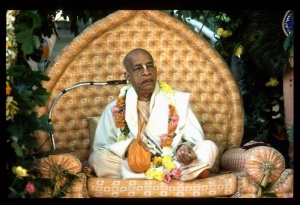CC Antya 3.207 (1975): Difference between revisions
(Vanibot #0027: CCMirror - Mirror CC's 1996 edition to form a basis for 1975) |
(Vanibot #0020: VersionCompareLinker - added a link to the Version Compare feature) |
||
| Line 2: | Line 2: | ||
<div style="float:left">'''[[Sri Caitanya-caritamrta (1975)|Śrī Caitanya-caritāmṛta (1975)]] - [[CC Antya (1975)|Antya-līlā]] - [[CC Antya 3 (1975)|Chapter 3: The Glories of Śrīla Haridāsa Ṭhākura]]'''</div> | <div style="float:left">'''[[Sri Caitanya-caritamrta (1975)|Śrī Caitanya-caritāmṛta (1975)]] - [[CC Antya (1975)|Antya-līlā]] - [[CC Antya 3 (1975)|Chapter 3: The Glories of Śrīla Haridāsa Ṭhākura]]'''</div> | ||
<div style="float:right">[[File:Go-previous.png|link=CC Antya 3.206 (1975)|Antya-līlā 3.206]] '''[[CC Antya 3.206 (1975)|Antya-līlā 3.206]] - [[CC Antya 3.208 (1975)|Antya-līlā 3.208]]''' [[File:Go-next.png|link=CC Antya 3.208 (1975)|Antya-līlā 3.208]]</div> | <div style="float:right">[[File:Go-previous.png|link=CC Antya 3.206 (1975)|Antya-līlā 3.206]] '''[[CC Antya 3.206 (1975)|Antya-līlā 3.206]] - [[CC Antya 3.208 (1975)|Antya-līlā 3.208]]''' [[File:Go-next.png|link=CC Antya 3.208 (1975)|Antya-līlā 3.208]]</div> | ||
{{CompareVersions|CC|Antya 3.207|CC 1975|CC 1996}} | |||
{{RandomImage}} | {{RandomImage}} | ||
==== TEXT 207 ==== | ==== TEXT 207 ==== | ||
| Line 11: | Line 10: | ||
<div class="verse"> | <div class="verse"> | ||
:yāha ghara, kṛṣṇa karuna kuśala sabāra | :yāha ghara, kṛṣṇa karuna kuśala sabāra | ||
:āmāra sambandhe duḥkha nā ha-uka | :āmāra sambandhe duḥkha nā ha-uka kāhāra" | ||
</div> | </div> | ||
| Line 25: | Line 24: | ||
<div class="translation"> | <div class="translation"> | ||
"All of you may now go to your homes. May Lord Kṛṣṇa bestow his blessings upon you all. Do not be sorry because of my being insulted." | |||
</div> | </div> | ||
| Line 32: | Line 31: | ||
<div class="purport"> | <div class="purport"> | ||
From this statement by Haridāsa Ṭhākura, it is understood that a pure Vaiṣṇava never takes | From this statement by Haridāsa Ṭhākura, it is understood that a pure Vaiṣṇava never takes anyone's insults seriously. This is the teaching of Śrī Caitanya Mahāprabhu: | ||
:tṛṇād api sunīcena | |||
:taror api sahiṣṇunā | |||
:amāninā mānadena | |||
:kīrtanīyaḥ sadā hariḥ | |||
"One should chant the holy name of the Lord in a humble state of mind, thinking oneself lower than the straw in the street. One should be more tolerant than a tree, devoid of all sense of false prestige and ready to offer all respects to others. In such a state of mind one can chant the holy name of the Lord constantly." A Vaiṣṇava is always tolerant and submissive like trees and grass. He tolerates insults offered by others, for he is simply interested in chanting the holy name of the Lord without being disturbed. | |||
</div> | </div> | ||
Latest revision as of 01:15, 27 January 2020

A.C. Bhaktivedanta Swami Prabhupada
TEXT 207
- yāha ghara, kṛṣṇa karuna kuśala sabāra
- āmāra sambandhe duḥkha nā ha-uka kāhāra"
SYNONYMS
yāha ghara—go to your homes; kṛṣṇa karuna—may Lord Kṛṣṇa bestow; kuśala sabāra—blessings to everyone; āmāra sambandhe—on my account; duḥkha—unhappiness; nā ha-uka—may there not be; kāhāra—of anyone.
TRANSLATION
"All of you may now go to your homes. May Lord Kṛṣṇa bestow his blessings upon you all. Do not be sorry because of my being insulted."
PURPORT
From this statement by Haridāsa Ṭhākura, it is understood that a pure Vaiṣṇava never takes anyone's insults seriously. This is the teaching of Śrī Caitanya Mahāprabhu:
- tṛṇād api sunīcena
- taror api sahiṣṇunā
- amāninā mānadena
- kīrtanīyaḥ sadā hariḥ
"One should chant the holy name of the Lord in a humble state of mind, thinking oneself lower than the straw in the street. One should be more tolerant than a tree, devoid of all sense of false prestige and ready to offer all respects to others. In such a state of mind one can chant the holy name of the Lord constantly." A Vaiṣṇava is always tolerant and submissive like trees and grass. He tolerates insults offered by others, for he is simply interested in chanting the holy name of the Lord without being disturbed.